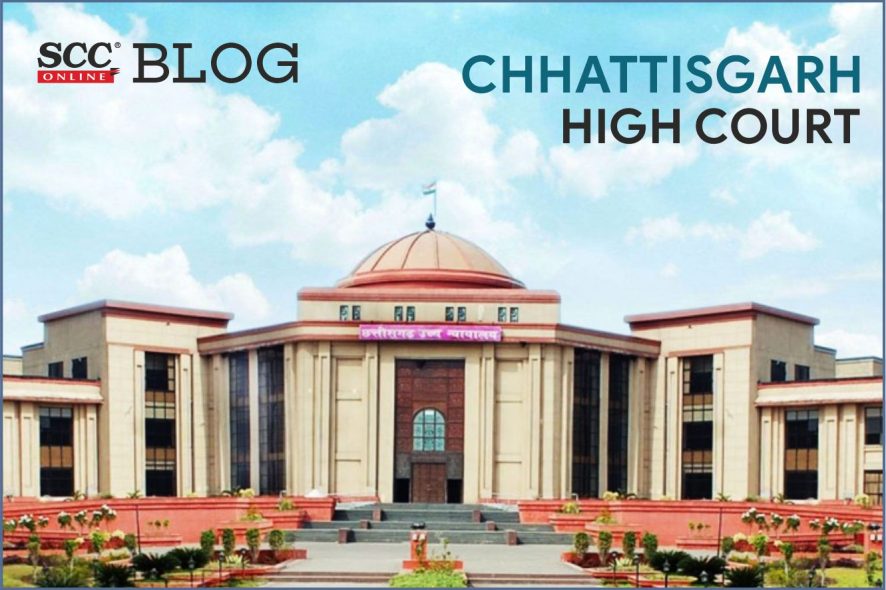Chhattisgarh High Court: In a writ petition filed for quashing of the notification dated 21.6.2016, whereby the State Government has amended the Chhattisgarh Secretariat Service Recruitment Rules, 2012 and added a new Clause 6 in Rule 13, the division bench of Arup Kumar Goswami, C.J. and Deepak Kumar Tiwari, J has observed that it is explicit that there is no malafide exercise of powers for extending relaxation by the impugned notification nor there was any occasion to issue conditional appointment order to such candidates who have not passed the Skill test and to give them two years’ time to pass the aforesaid tests. As 36 candidates had fulfilled the requisite conditions earlier, therefore, they were placed above the petitioners in the gradation list. There is no material to show that the State Government has exercised the power of granting relaxation with an oblique or unauthorized purpose.
In the present case, the Department of General Administration had issued an advertisement for 100 posts of AG-III on 24.8.2005. The petitioners had applied for the said post and appeared in the examination conducted by the Chhattisgarh Madhyamik Shiksha Manda, and all the petitioners succeeded in the written examination. As per the terms and conditions of the selection process, the probation period would commence from the next date of passing of the departmental examination, however, in the case of some candidates, the respondent authorities commenced the probation period from the date of their joining, which has caused dissatisfaction and the gradation list has also been affected. Thus, the petitioners prayed for the quashment of the notification dated 21.6.2016, the gradation list with effect from 1.4.2011 and asked for the grant of seniority from the date of their joining.
The Court noted that as per the conditions stipulated in the advertisement dated 24.8.2005, a candidate must pass the computer skill test and Hindi typing examination, but it was found that 61 candidates did not clear these tests, and the above condition was made applicable only for the candidates who have not acquired the certificates of both the tests at the time of appointment and not passed the test at the first instance. Thus, the Court observed that there was no error in fixing the seniority of the candidates, as the petitioners did not pass both the tests, thus the candidates who were qualified at the first instance were placed above them.
The Court took note of the ruling in Hardev Singh v. Union of India, (2011) 10 SCC 121, wherein the Court held that “it is always open to an employer to change its policy in relation to giving promotion to the employees”, thus the Court observed that “it is a settled law that no employee has a right to get promotion, but only has a right to be considered for promotion. It is also well settled that the employer has power to change its policy in giving promotion to its employees”
The Court also took note of the ruling in Rajendra Kumar Agrawal v. State of U.P., (2015) 1 SCC 642, wherein on the issue relating to power of relaxation for filling up the posts by promotion, the Court observed that “we do not find any material to show that the State Government resorted to exercise of power under Regulation 20 for some unauthorised purpose”. It further placed reliance on the ruling in State of U.P. v. Vikash Kumar Singh, (2022) 1 SCC 347, wherein it was observed that “relaxation may be at the discretion of the competent authority, and it cannot be prayed for as a matter of right. If a conscious decision is taken not to grant the relaxation, merely because the Rule permits relaxation, no writ of mandamus can be issued directing the competent authority to grant relaxation in qualifying service”.
Thus, the Court viewed that the petitioners have utterly failed to demonstrate that the impugned notification dated 21.6.2016, wherein the State Government has amended the subject Rules by adding new clause 6 in Rule 13, was issued by the State with an oblique or unauthorized purpose, which shows any arbitrariness on the part of the State. Further, the Court cannot strike down a policy decision taken by the Government merely because it feels that another policy would have been fairer or wiser or more scientific or logical as it is not within the domain of the Court to weigh the pros and cons of the policy or to test the degree of its beneficial or equitable disposition. The power of relaxation is within the exclusive domain of the State Government and, therefore, impugned notification cannot be held to be bad in law.
Moreover, placing reliance on the decision in Rashmi Mishra v. M.P. Public Service Commission, (2006) 12 SCC 724, the Court viewed that the petitioners have not placed all the selected candidates as party respondent, thus, the writ petitions suffer from non-joinder of the necessary party, and no relief can be granted to them.
[Vidya Bhushan v. State of Chhattisgarh, 2022 SCC OnLine Chh 1559, decided on 02.09.2022]
Advocates who appeared in this case:
For Petitioners: Senior Advocate Kishore Bhaduri
Advocate Vivek Verma
Advocate Santosh Bharat
For Respondents: Deputy Advocate General HS Ahluwalia
Advocate Animesh Tiwari
Advocate Akhand Pratap Pandey







